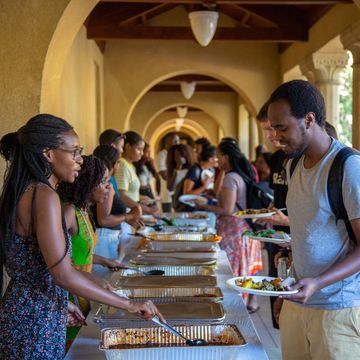Africa Table
About

The Center for African Studies hosts its weekly lecture series Africa Table every Wednesday from 12:00-1:00 pm in 123 Encina Hall, 615 Crothers Way on Stanford's Campus.
Africa Table has been held on the same day, at the same time for over 30 years, hosting speakers from around the world on topics ranging from hip-hop to public health, generating lively discussions. Over the years CAS's growing number of students, faculty, staff, and community members has flourished. We look forward to welcoming you to learn with us at one of Stanford's most successful and attended lecture series.
Student Reflection
"My favorite event hosted by CAS is the weekly Africa Table. I have learnt a lot from speakers on many different topics about and related to various countries and communities within Africa. Africa Table has been a great opportunity to learn outside of class. I like that I can get up to date on academic, social, and political developments on the continent and simultaneously have a midweek check in with my favorite people on campus. One of my favorite Africa Table talks was about the colonial era looting of art from the Senufo region in West Africa to Europe. There is so much about Africa that I have learnt at Africa Table that I would never have the opportunity to learn elsewhere. The food is always fantastic as well."
-CHARLES MULEMI, B.S. COMPUTER SCIENCE ‘17
Upcoming Events
615 Crothers Way, Stanford, CA 94305
Room 123
Join us for a special Africa Table session featuring graduate students' work, including presentations by Zahra Fazal and Venolia Rabodiba.
615 Crothers Way, Stanford, CA 94305
Room 123
Focused on calls for pedagogies of resistance to reimagine pathways towards more dignified and humane urban livelihoods, I will share a sequence of collaborative experiments over the last decade…
Past Events
615 Crothers Way, Stanford, CA 94305
Room 123
There is a Rwandan saying, "When you are well, you belong to yourself. But when you are sick, you belong to your family."
450 Jane Stanford Way, Building 460, Stanford, CA 94305
Room 426
Professor John R.
615 Crothers Way, Stanford, CA 94305
123
In this presentation I discuss spatial strategies through which capitalism continues its accumulation through invisible and devalued work of social reproduction…
615 Crothers Way, Stanford, CA 94305
123
For the last 120 years Nairobi has been thought of as a city of temporary migrants.
615 Crothers Way, Stanford, CA 94305
Room 123
Before the rise of sugar production in the Americas and Caribbean, Saʿdian Morocco (1541-1631) briefly prevailed as one of the world’s top producers and exporters of sugar.
615 Crothers Way, Stanford, CA 94305
Room 123
Africa has become a major platform from which to analyse and understand China's growing influence in the global South. Yet, the impact of their historical relationship has been largely overlooked…
A large literature documents the electoral benefits of clientelistic and programmatic policies in low-income states.
In recent years, some African countries have banned discrimination based on sexual orientation while others have proposed draconian anti-gay laws.
In dominant-party states, why do individuals vote in elections with foregone conclusions when they are neither bought nor coerced? In this Africa Table discussion, Dr.
Outsiders often perceive Africa as a continent in crisis, and many blame Africans for their plight. Schmidt challenges this position, arguing that many current crises are the result of…











